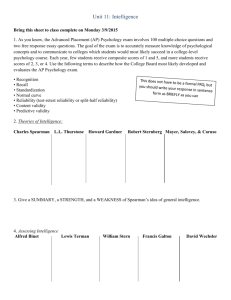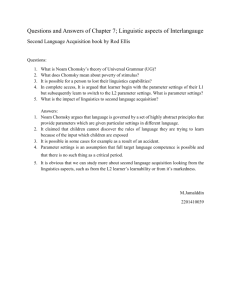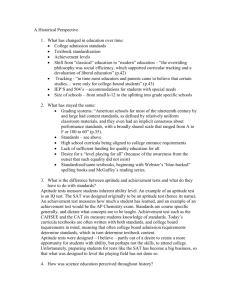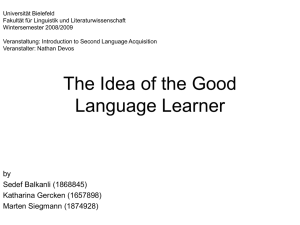Unit IV
advertisement
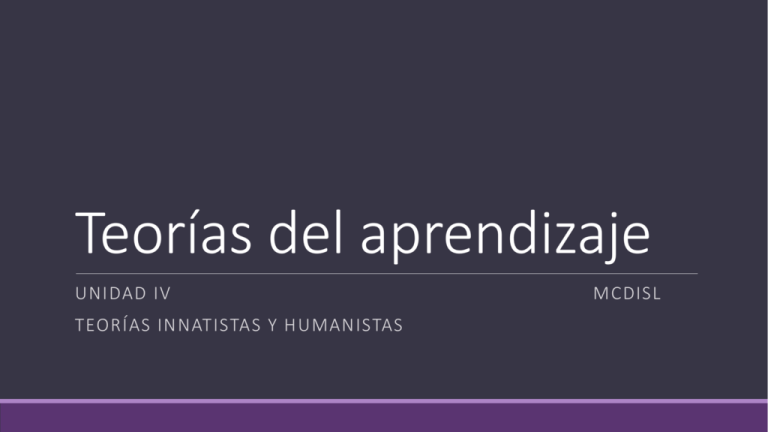
Teorías del aprendizaje UNIDAD IV TEORÍAS INNATISTAS Y HUMANISTAS MCDISL Temas: 4.1 Las ideas de Chomsky 4.2 Aspectos biológicos que intervienen en el aprendizaje 4.3 El intelecto y las emociones en el aprendizaje de idiomas 4.4 La enseñanza indirecta 4.5 El paradigma humanista Noam Chomsky Infography Chomsky is considered one of the most important linguistics in the twentieth century. His main contribution in the field of linguistics is the infuential “transformative-generative gramar” Which is an attempt to describe the syntactical processes common to all human language mathematically (Smith, 1999) Chomsky draws a key distinction between the deep structure and surface structure of languages. Deep structure => the meaning of the sentence is hardwired in the human brain. Surface structure => once the meaning is converted into sounds and words in a sentence. Language acquisition device (LAD) Used to explain the acquisition of syntactic structure of language. This falls under the realm of the nativist theory of language which states that humans are born with the innate abiliy for acquiring language (McGilvray, 2005) The language organ that emerges, the gramar, is represented on the brain and plays a central role in the person’s use of language ABOUT EDUCATION, Chomsky complains that children are not taught to challenge and think independently, yet they are taught to repeat, follow orders and obey. Education is described as a period of regimentation and control, with a system of false beliefs. Based on these analysis, the goals of education should be to encourage the development of the child’s natural capacity Theory of Knowledge: Generative gramar and Cognitive theory His theory of Generative gramar, though constantly evolving, stands as a microcosm of his views on the human mind’s methods of taking in and storing information. Is a way to describing the way people learn to communicate. The core of this theory is the idea that all human language originates from a common source, an innate set of gramatical rules and approaches that is hardwired into the human mind. This is a very naturalistic approach, but one that has found ever increasing acceptance amongst experts in the field (Chomsky, 1986) “Innate and natural gramar that really sticks.” His fundamental approach to knowledge is very similar to that used in INFORMATION PROCESSING THEORY. According to Chomsky, in order for knowledge to be retained, there must be previous knowledge already present for the new information to be associated with. He tipically refers to this process as “building” on prior knowledge, but it has obvious parallels with the “networking” described by IPT. Particulary in the process of taking in information initially, generative gramar has direct parallels with the ideas put foward for information processing theory (Miller, 1956) Chomsky says: Each and every language spoken today, then, would have a common root in the language center of the human brain. The different forms that those languages then took could be attributed to different opportunities and approaches to networking the new verbiage* and sintaxis. *jerga. Chomsky purports that some aspects of language are explicitly taught in school such as the spelling conventions of the wirtten representation of language and forms of technical vocabulary; however, the most fundamental aspects of language are universal. Chomsky also asserts that there is a genetically determinated “window of opportunity” for language acquisition. For example, it can be said that we do not need to “learn” that our language contains nouns and verbs (Smith, 1999). We do however; need to learn the noises within the language that are associated with nouns and verbs. About teaching methods… Chomsky states that teaching is mostly “common sense” It does not matter what is covered; but how much you develop the capacity to discover. The best method of teaching is to make it clear that the subject is worth learning, and to allow the child’s--- or adult’s--- natural curiosity and interest in truth and understanding to mature and develop. Intelligence, aptitude and emotions in ESL Cognitive variables • intelligence • aptitude • personality What’s intelligence? Relation between IQ and the learning of a foreign language (Johnson, 2008) What do you need to be a good language learner? Which traits are needed? What makes a bad language learner? Are you an adecuate language learner?, why? What makes some students successful on language learning? Why the differences? Is there a relationship between intelligence and language learning? Intelligent people can learn faster and better a language? Ancient ideas about whom should learn a foreign language Only the most intelligent… a FL help develop intelligence Erick Lenneberg (1921-1975) When acquiring a language the brain stays at the basic developmental level Robert Gardner & Wallace Lambert (1972) Chapter of a book called “aptitude for languages, intelligence and success on the foreign language learning” Genesee (1976) Based on immersion programs on Canada To relate better french learning & IQ Conclusion: Conclusion: Conclusion: There’s no relationship There’s a little realtionship between intelligence and the succes on FLL ✔ ¨linguistic skills” (write & read) and Intelligence ✖ “communicative skills” (listening & speaking) and intelligence Based on Genesee studies Chastain (1969) IQ & methods 1) IQ & audiolinguism . Conclusion => no relationship 2) IQ & Cognitive code. Conclusion => there’s a relationship So, is there a relationship between intelligence and a FL learning? … could be It is necessary to be intelligent in order to learn with methods that use intelligence. Intelligence, aptitude and emotions in ESL Cognitive variables • intelligence • aptitude • personality Aptitude There must be a clarification about the relationship of the concepts: Aptitude & efficiency and competence Aptitude => looks prediction (capability or innate ability to do… to be able to succeed on …) Efficiency and competence => how well you did on… Carroll (1973).- everybody is able to acquire, is just that some will do it faster tan others Pimsleur.- battery of aptitude for languages (LAB) Carroll and Sapon (1959) Modern Language Aptitude Test (MLAT) MLAT Ability of phonetic codification Grammatical sensibility Ability of inductive learning Ability of memorizing Ability of phonetic codification “the ability of coding the phonetic audible material in a manner that can be recognized, identified and remembered during a major lapse than a few seconds” It is something else than memorizing, it means the association of sounds and symbols. Carroll states that not only the sense of hearing is involved but also the brain. * page 197 Grammatical sensibility The ability of an individual to demonstrate his/her conciousness about syntactic structures of the sentences on a certain language. How aware are you about the way mother language L1 works. Ability of inductive learning The ability to study the linguistic material… and from there, observe and identify patterns of correspondence and relationships in which matters the meaning or the grammatical form (Carroll, 1973) Ability of memorizing The ability to learn by memorizing things Intelligence, aptitude and emotions in ESL Affective variables • motivation • attitude Motivation A) Integrative motivation.(Roots and culture). used as a person’s motive to integrate to a society or culture. Aculturation theory of Schumann is based on this motivation. GARDNER & LAMBERT (1972) Studied the correlation & competence BURSTALL INFORM Study of the pyschological variables & french learning. - Motivation not a 100 % integrative or instrumental, motives are complex and difficult to adjust to a cathegory -Gender differences. More integrative motivation of females (sexist traditions) - Not reliable answers. People hide real feelings about the aspirational culture. B) Instrumental motivation.- the one people have to reach a goal ( pass an exam, get a better job, etc) LUKMANI (1972) Studied the correlation of instrumental motivation & success in English learning. Controversial points: - Alberto’s case - Maquiavelism - “resultant hypothesis” . Motivation leads to success and viceversa. Attitude (types) A) the one someone has towards the reference or aspirational group B) the level of the learner towards that group, and therefore have a good accent C) the elemental level. School and academic advance of the ss. D) geographical surrounding. Sometimes it matters, sometimes not. E) the attitude towards success (satisfied needs). The degree in which a ss look foward to goals, best ss => good for everything including languages. F) the attitude towards the teacher. Not determinated results G) the attitude towards the own country. Etnocentrism (if my country is the most important, everyone else should learn my language). Anomie (lack of attachment to the own culture therefore wants to belong to the aspirational culture) SPOLSKY (1969) JAKOBOVITS (1970) created a scale or instruments for this variable. To think about attitude… Can the teachers control the students’ attitudes? Maybe the rol of the teachers is to “create attitudes” instead of “modifiying “ them. Personality variables. Not in this unit but look at the book ! Check your options… research Indirect instruction The indirect instruction is an approach to teaching and learning in which concepts, patterns, and abstractions are taught in the context of strategies that emphasize concept learning, inquirí and problema solving In indirect instruction, the learner acquires information by transforming stimulus material into a response that requires the learner to rearrange and elaborate on the stimulus material. Let’s watch some examples and verify our answers. Humanistic Language Teaching Team work. References About Chomsky <a href="https://voxy.com/blog/index.php/2011/04/the-chomsky-school-of-languageinfographic/"><img src="http://voxy.com/blog/wp-content/uploads/2011/04/111804-VOXYCHOMSKY-565x1951.png"></a><br/>Via: <a href="https://voxy.com/blog">Voxy Blog</a> Johnson, Keith - Aprender y enseñar lenguas extrajeras. Una introducción. FCE 2008.
